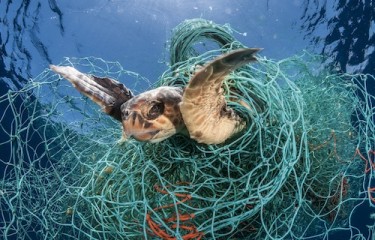With abandoned, lost and discarded fishing gear (ALDFG) estimated to account for 70 percent (by weight) of floating microplastics debris in the open ocean and posing a considerable threat to ocean animals and fish stocks, Thai Union Group PCL has joined the Global Ghost Gear Initiative (GGGI) with the promise to support efforts aimed at reducing the pollution problem.
While Thai Union does not own fishing fleets, Dr. Darian McBain, the seafood company’s global director for sustainable development, said that the sheer volume of fishing-related microplastic debris (also known as “ghost gear”), as well as its impacts on global food security, the seafood supply chain and the livelihoods of coastal communities led to the move.
“To me that 70 percent statistic was phenomenal,” said McBain. “We had been looking at what we could do with our packaging, where our role was with regard to plastic consumption and by consequence reducing the plastics that are in the ocean, but it was clear that the most material thing Thai Union could do was to become included within the Global Ghost Gear Initiative and take a proactive and leadership role in both advocating for people to do more but also doing more ourselves.”
Thai Union’s participation in GGGI is aligned with its SeaChange sustainability strategy, and reducing ghost fishing gear is key to ensuring sustainable seas today and for future generations, she said.
“One of SeaChange’s four pillars is responsible sourcing and I think this fits neatly within that pillar in that we look at what and how we are sourcing, and also at the vessels, which are very much within our supply chains. This is an issue that’s directly related to fishing vessels.
“There is also a direct link to human consumption, where we need to proactively do something about reducing pollution in the oceans, and this seemed like one of the most significant things that we could do.
“GGGI is a global initiative that has been working for a few years, but we want to really help build that momentum and get a lot more work happening that’s really going to have an impact on the oceans.”
Founded in 2015 by World Animal Protection, GGGI is the world’s only collective alliance dedicated to solving the problem of lost and abandoned fishing gear. Its diverse participants include members of the fishing industry, the private sector, academia, governments, intergovernmental organizations and NGOs.
The alliance now has 12 government supporters and 68 commercial and non-commercial partners, collaboratively working to find ways to solve the problem of ghost fishing gear globally by building evidence, planning best-practice and catalyzing solutions, explained Joel Baziuk, secretariat for GGGI.
“We’re extremely excited to have Thai Union join our work, they have been leaders in the fishing sustainability arena for many, many years and this was something that they actively wanted to get engaged with,” said Baziuk.
“This partnership makes a lot of sense and we are hoping that others will follow Thai Union’s example by really embracing this issue, acknowledging it, and working together with GGGI and the rest of our participants at a holistic and global level.”
Baziuk also said that the problem of ghost fishing gear and its impacts on the ocean are increasingly entering the industry consciousness.
Not only is ghost fishing gear accountable for a significant number of marine mammal deaths each year, including whales, turtles and dolphins, it is also responsible for an estimated 10 percent reduction of global fish stocks, with certain gear types such as gillnets causing depletions of as much as 35 percent in some areas, he said.
“Going back just a few years ago, ghost gear wasn’t something that was really well known. It wasn’t very well understood, but we are now getting to the point where the impacts are becoming much clearer. About 136,000 whales, sea lions, dolphins and birds are estimated to be killed by it every year, not to mention a 5 to 35 percent decline in fish stocks, so we are talking about global food security, animal welfare, the livelihoods of people who depend on the ocean and the benefits for the ocean itself.
“The reason I think we didn’t know much about it or why it hasn’t been that visible is that it literally isn’t visible – it’s underneath the surface of the ocean. The oceans are unimaginably vast as it is, but much more so when we add the depth to that and what’s happening beneath the waves – that’s where these impacts become more prevalent. And as we start to understand it, more and better information becomes available,” said Baziuk.
The United Nations Food and Agriculture Organization (FAO) estimates that every year approximately 8 million metric tons (MT) of plastic enters the ocean, most of it urban waste, particularly plastic litter and microplastics. Ghost gear accounts for at least 10 percent of the total waste.
Photo credit: Jordi Chias, naturepl.com







